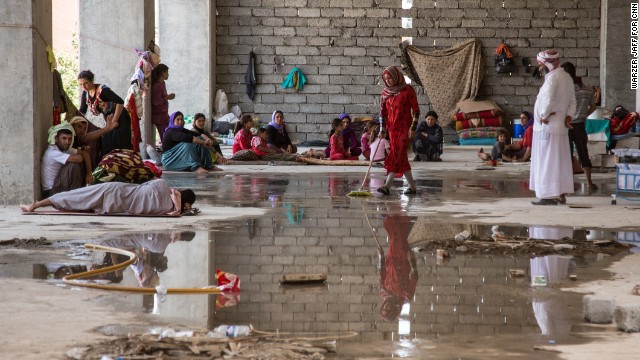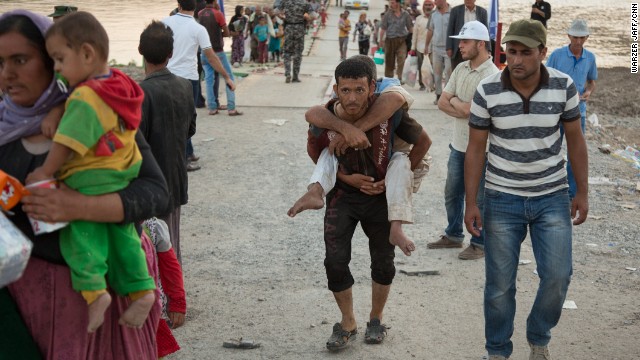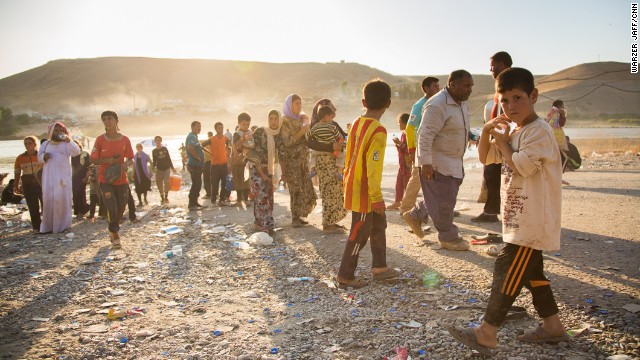Despising The 'Other'
"There are Arabs to the west of us, Arabs to the east and south of us."
"They are killing us, all of us. Whether it's Islam or whatever, they just want to kill us."
Sardar Barpiri, 35, Lalish, Iraq
"We are never going home. Whether it means going to Britain, Germany, America -- anywhere, we are not going back. We are a target because of our religion. There's nothing more to be said."
Firaz Falas, Yazidi refugee
 A Yazidi
family from Sinjar cleans a spot for themselves in a derelict building
that houses more than a thousand other refugees on Thursday, August 14,
in Zakho, Iraq.
A Yazidi
family from Sinjar cleans a spot for themselves in a derelict building
that houses more than a thousand other refugees on Thursday, August 14,
in Zakho, Iraq.
Jamal Jamir, a
23-year-old university student from Sinjar, spoke with CNN, telling an interlocutor that his family fled to
the barren and windswept Mount Sinjar more than a week ago after ISIS
captured their town. After ISIS
arrived in his town, their Arab neighbors turned on the minorities and
helped ISIS. "They join them, and actually they kill us."
People you know?" CNN asked.
"Yes," he responded. "People -- our neighbors!"
Jamir's family was among tens of thousands who flocked to the mountain and desperately waited for airdrops of food and water. Jamir's family escaped to
Mount Sinjar on foot then made an arduous 15-hour journey to Syria. After
traveling northeast along the border, many families have been crossing a
bridge in Faysh Khabur, back into Kurdish-controlled Iraq.
Jamir said two of his young brothers didn't make it. "What we do?" he said. "Not enough water and dusty. ... They died. We are poor people. We don't have any problem with anybody. We need someone (to) help us."
Some Yazidis, assembled at their sect's holiest temple, the Shrine of Sheikh Adi, are aware that it will shortly be destroyed. Though they have lived in the barren rugged hills of northern Iraq for millennia, their expulsion from their largest centre of population, Sinjar, has signalled the end of their time in the land that is most familiar and dear to them. They have no option but to leave their sacred shrines to what they know will befall them.
Persecution is not new to the Yazidis. They have suffered persecution and fled out of Turkey and Syria. In Iraq, under Saddam Hussein, they lived as an impoverished underclass in the most barren geography of the country. A relative handful of poorly armed local militia members stand guard over the Shrine of Sheikh Adi, to protect it from the approaching jihadists. From Sinjar where they drove those who escaped death into the mountains, they now stride toward Lalish.
"They stopped the families at the checkpoint. They put them on the side of the road and shot them, one after the other. Then I saw something else. They brought a bulldozer, and dug a grave, and put the bodies in", said Dakhil Sedo Khero, 35, who fled with his family as the Islamic State jihadists approached to storm his village.
He, along with his wife, their seven children and 40 other members of their extended family struggled over the mountain above their town while Iraqi jets bombed the jihadist positions, and they eventually joined the flood of thousands of Yazidis through Syria and back again into the safety of Iraqi Kurdistan.
Shekhan, the second-largest centre of Yazidi population after Sinjar, is where residents of Sinjar fled in their tens of thousands, to find temporary haven. And when rumours rumbled through the town that the Islamic State was set to enter there, they fled again, this time to the temporary shelter of Mount Sinjar, with nothing to sustain them on the mountain; no food, no water, no hope.
 A young refugee carries a disabled man across the bridge.
A young refugee carries a disabled man across the bridge.Once again they are outcasts, with no home of their own, all their possessions left behind to be destroyed and looted by the jihadists. They are an offshoot sect of the Kurds who are Muslims, but recognize the Yazidis worshipping an ancient religion to be their brethren. Should the Kurds in Turkey, Iraq and Syria finally unite in a slice of shared geography that they can call their own, the Yazidis would find there haven with others who value their existence and extend equality to others.
 A
number of those who made the treacherous trek off the mountain told CNN
that PKK fighters control parts of the mountain, and they fed and
protected them from ISIS.
A
number of those who made the treacherous trek off the mountain told CNN
that PKK fighters control parts of the mountain, and they fed and
protected them from ISIS.Labels: Atrocities, Humanitarian Aid, Iraq, ISIS, Islamism, Jihadis, Kurds

<< Home